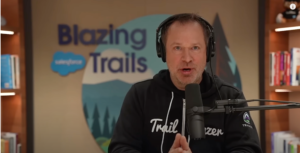
In the past, I had the good fortune of working with the Get Satisfaction team to help brands embrace new media to improve customer relationships. During those early years, I learned a great deal about the process and corresponding hurdles that face change agents as organizations evaluate new technology to socialize CRM. I also began what would later become years of immersion in understanding and defining the role leadership plays in changing organizational culture and methodologies to help businesses truly get closer to customers. Along the way, I met Jeff Nolan, at the time, a venture capitalist and later an operational executive. Jeff is now VP of Product Marketing at Get Satisfaction and we recently spent some time together talking about, well, everything. It was a great discussion that ended up as two posts…”Brevity and Depth: Part 1 and Part 2.”
Every now and then, I like to share discussions like these with you here. Hope it helps you…
Jeff Nolan: Brian, we have known each other for the better part of 10 years now… and one of the things that I have always admired about you is the ability to capture the meta layer that connects a range of loosely connected topics. What is the meta that ties off the notion of republishing a book in near realtime, a book that you first published just 13 months ago?
Brian Solis: Jeff, thank you. You and I have run in the same circles for the last decade and the one thing that I’ve always appreciated about working in Silicon Valley and in technology is the genuine fellowship that exists amongst peers. Over the years, I’ve been challenged, inspired, and driven to earn my place within the rapidly shifting landscape of new media.
To this day, I’m often asked by my immediate peers why I spend so much time investing in writing books. We live in a real-time world after all and books are often outdated by the time they’re published. The insights that serve as the foundation for books are now in large part, fueling some of the best blogs in the business.
My response remains the same. Book reach an audience that blogs don’t yet captivate and it was my aspiration to extend the importance and promise of new media and its impact on business and culture to the people who could most benefit from it. The challenge however, was indeed writing about an industry in constant flux and having it retain value not just at the date of publishing but for years beyond. As a result, I focused on the core principles and tenets of new media and the new world of business using technology as an enabler, but not its focus. In my opinion the original Engage that was released in March of 2010 is well preserved and still incredibly relevant – and will be for quite some time.
When it came time to re-release Engage in paperback I opted to revise the manuscript, not because I felt it was outdated or that there was anything missing, I just saw a chance to practice what I preach. Over the last year, I listened to Tweets, posts, and reviews and found an opportunity to conserve Engage in hard cover while using the paperback as a new vehicle to incorporate suggestions and requests for a different take on an important subject… engagement.
Jeff: In a world of 140 character tweets and activity streams at every turn, what is the value of a cover-to-cover book today?
Brian: With Twitter and Facebook and every other network that defines the statusphere, we are conditioned to publish and consume content at a rapid fire pace. In many ways, we compete for attention at every moment – all in 140 character bursts at a time (well 120 if we hope our words are to be retweeted.) I believe brevity fuels a hunger for depth. If the subject matter is interesting and there’s a discernible market for it, a collection of Tweets and a constantly updated blog would not satisfy the appetite for enlightenment or captivation. A book carries a greater purpose of guiding the reader through a dedicated experience that allows for focus and deeper understanding and engagement. The statusphere quenches an fleeting thirst or satisfies an immediate hunger. A book, a good book, provides sustenance that feeds the mind and soul with lasting effect. With electronic readers and tablets migrating toward the mainstream, it is possible to extend experience and allow people to subscribe to ideas where media between deeper dives creates a dedicated and ongoing stream.
Jeff: You cut 35,000 words and 40 sections from the second edition, and then added new sections as well as updated existing sections. In short, this is a significant update… does this suggest that your audience should be subscribing to your book rather than buying it? And isn’t that essentially what they are doing through the Brian Solis brand as opposed to the book you are releasing?
Brian: Yes, in this second edition, I edited out 35,000 words and 40 sections from the original. To put that in perspective, that’s over one-half the length of a standard business book. I also took the opportunity to add new sections and also introduce significant updates to each chapter.
Seems almost like a perfect segue between the last question and this observation. Education, entertainment, experiences, are often most effective and lasting when they’re compartmentalized. Giving people a beginning and an end to an encounter delivers more than mere enlightenment giftwrapped with a sense of closure. Audiences already subscribe to the idea of the book by following me on Twitter, connecting with me on Facebook or reading my blog. But when there’s a topic worthy of submersion, those who are fascinated or curious will join in the journey while others will stay subscribed to the elevated stream.
Jeff: If subscription has merit, how would you bring together social media’s many types of content (e.g. video, long form text, short text, streams) and online social behaviors to augment the reader experience?
Brian: Currently I blog, curate, share short-form observations and experiences, and host a web show called Revolution (http://www. youtube.com/briansolistv). I invest in each form of media to address the unique and varying needs of my audiences. I’ve yet to find one sweeping strategy to rule them all however. For those seeking to truly cultivate a community, engagement comes at the prices of variety and consistency.
Jeff: As an author, how do you un-market to your audience?
Brian: As an author, I invest in the creation of value-added content that addresses the needs and questions of my peers and audience. While I sell books technically, I also provide free content that is no less the value of what I include in my books. I listen. I interact. I share my experiences and advice. I do so relentlessly. Investing in the caliber of information, solving problems, answering questions and offering direction is my way of marketing expertise through unmarketing.
Jeff: You have been a tireless advocate for companies using social media and online social behaviors to broaden and deepen brand loyalty, putting aside authentic behaviors for a minute, is this about companies themselves becoming more media company like in how they program content to a market?
Brian: We are witnessing businesses struggle with this very concept. They are are embracing social media and they’re experimenting with editorial programming as a result. Essentially brands are becoming media companies, however like all media companies, they are subjected to the trials and tribulations of producing useful, relevant and entertaining content. This is an area where many businesses will fail before they succeed. There is a great unfollow and unlike movement ahead of us. Sophisticated social consumers are realizing that the more they follow their favorite brands the more content appears in their News Feed and social stream. There are already studies that show people will gladly disconnect from a brand because content is irrelevant, boring, or promotional. To become a true media property, businesses should consider hiring an editor for social channels, a role I playfully refer to as the new CEO (chief editorial officer).
Jeff: Regarding authentic behaviors, we all demand that companies be more human but is that what we really want or is it that we just want them to be more competent?
Brian: Consumers have expressed the need for recognition and resolution among the top reasons for engagement. Beyond that, customers also want access to special offers, discounts, exclusive content now and over time. Competence is an interesting element however. Businesses have invested years of time, money and resources moving away from the customer when it comes to direct engagement. Now, social media are forcing businesses to rethink its service and engagement approach. Now getting closer to customers is cited as a top business priority. In order to build relationships, businesses must also reexamine the prevailing philosophy and infrastructure to create a sincere customer-centric culture. Without it, all attempts at engagement will malfunction. The future of business is reliant upon employees and supporting processes to genuinely facilitate meaningful engagement before, during, and after any financial transaction.
Jeff: Apple is a great example of a company that breaks all the rules, the CEO even answers customer emails… is this an exception driven by the unique personality of the CEO or is it something that all companies can and should learn from?
Brian: Apple is the exception to many rules. From crisis management to CEO engagement, I’m not sure they’re the best example for the future of an adaptive business focused on customer-centricity. However, their relentless pursuit of innovation and enhancing user experiences are indeed the attributes of an adaptive business. Apple designs experiences from beginning to end where products are just one part of the entire mission. From the web site to the product packaging to retail to the active online forums to genius support, the Apple experience is meticulously architected. I would also look at the Virgin America model for designing complete customer experiences as a signal for the future of adaptive business.
Jeff: Do you have any conversations with companies about social that does not involve a conversation about Facebook?
Brian: Facebook and Twitter represent the pillars of social media with every business I speak to. Now, whether or not their intentions or corresponding strategies are substantial, that’s a difference conversation. I encourage companies however to think about Facebook as their home page for the social web and to view Twitter as their window to relevance. Social consumers have varying needs and expectations when visiting a brand page. Why limit their experience to one campaign and a wall. Use tabs/pages to customize the experience for each. There is no one audience so design the Facebook clickpath around the value they’re seeking.
Jeff: Does Facebook evolve more along the lines of a country than a company given the scale they are currently operating at? By extension, could Facebook Credits achieve the tangibility that real currency has?
Brian: Facebook and other social networks are already funded by a widespread social currency. Credits represent a tangible form for monetizing transactions however, Facebook is cautious as it should be. There is a sense of neutrality needed by the “Bank of Facebook” while it grows. Estimates peg users at 700 million which is large, but nowhere near the total 6.8 billion who currently use the Internet.
Jeff: What do you think of companies who outsource their social fill-in-the-blank?
Brian: I’m not sure that I have a general response to this question. I do believe however, that intention counts for everything. If an external team can provide a genuine and empowered experience through direct engagement or through content creation, then I struggle to find a problem. On the other hand, if outsourcing occurs because social media represent a necessary evil or because it’s not deemed important enough for internal support, they will get out of it what they invest into it. Engage or die!
Connect with Brian Solis on Twitter, LinkedIn, Facebook
![]()
___
The New ENGAGE!: If you’re looking to FIND answers in social media and not short cuts, consider either the Deluxe or Paperback edition

___
Get The Conversation Prism:






The conversation about the usefulness and position of books in the overall barrage of content is an interesting one for sure.
I think you have it right Brian, the way we deal with all of our free content and interaction versus paid books, ebooks, and courses has to do with identifying patterns of desire, frustration and need for a deeper look at a given topic or end result and then digging deeply into systematizing a response that will get the majority of people the help they are looking for. Then we may offer consulting, coaching or contract work to help those who want very specific or private assistance.
Enjoyed the discussion.
Thank you Jeff…well said.
I really felt a moment of inspiration when I read Brian’s introduction of the CEO of our times – the Chief Editorial Officer.
As a journalist and broadcaster I bask in the warm glow this gives to use conscientious content creators. That’s on a superficial level, however: In reality I wonder whether companies will seize upon this opportunity to rise like cream to the top of the marketing mountain, or whether they’ll discredit themselves from consumers’ social media radars by churning out the same old, same old that Brian rightly says will turn everyone off.
We’re at a critical juncture in the evolution of social platforms and their potency for the future: I hope a great many big brands heed Brian’s advice and lead others by example.
Excellent first-parter, Mr S. Can’t wait for you to rock out the second.
Thank you Dave. What a wonderful comment. First, you are right…this why we have our work cut out for us. We must ensure that we market through a form of value-added unmarketing. p.s. I put parts 1 & 2 in this post. Cheers!
That’ll teach me to read inspiring posts on my smartphone. Missed that completely. Have a great week, Brian – and keep rocking out the great content. I’m at Thinking Digital in the UK from tomorrow so will let you know what transpires from there relevant to your niche.